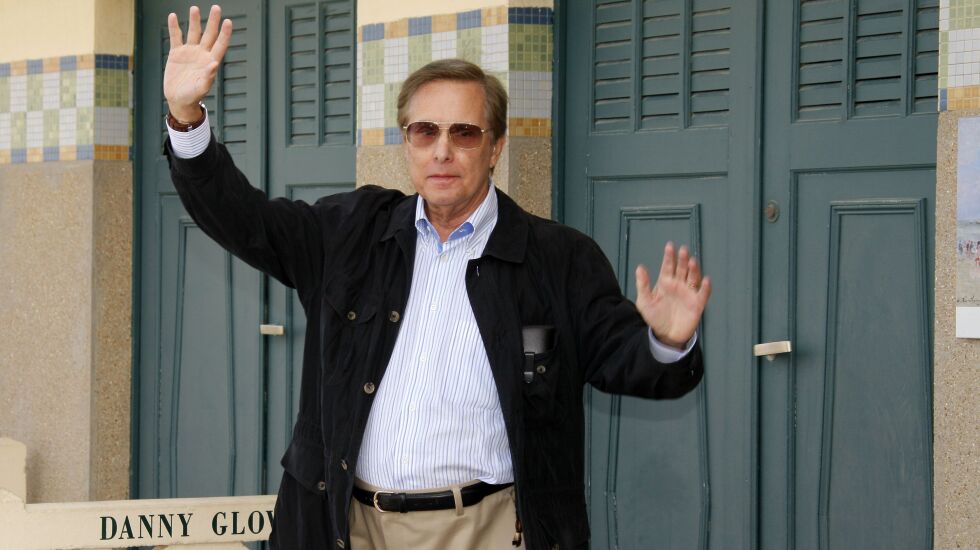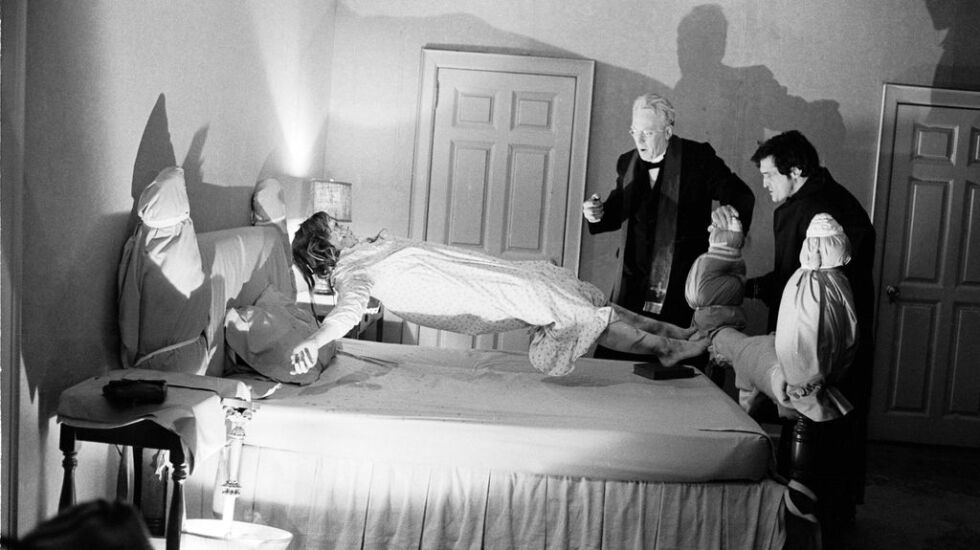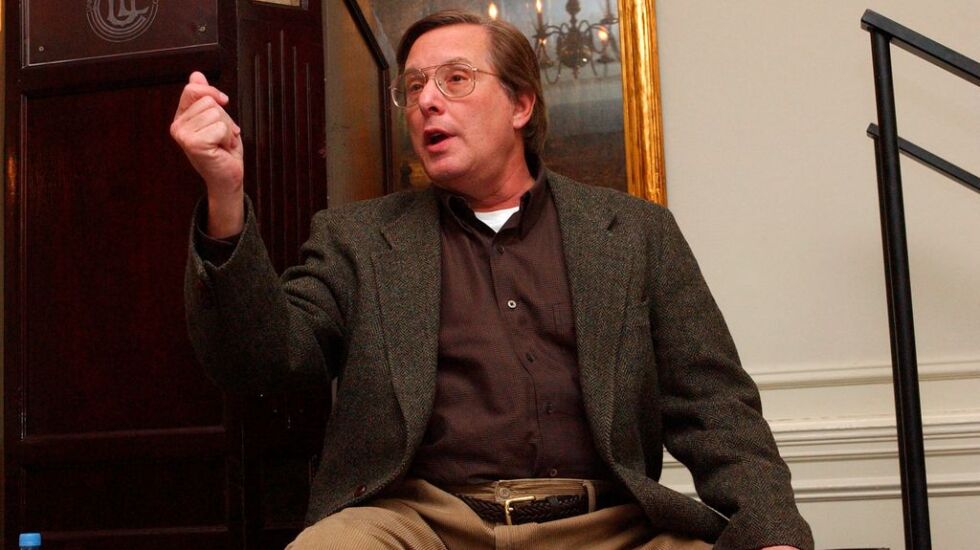
LOS ANGELES — William Friedkin, the Oscar winning director who became a top filmmaker in his 30s with the gripping “The French Connection” and the horrifying “The Exorcist” and struggled in the following decades to match his early success has died. He was 87.
Friedkin, who won the best director Oscar for “The French Connection,” died Monday in Los Angeles, Marcia Franklin, his executive assistant for 24 years, told The Associated Press on behalf of his family and wife, former studio head Sherry Lansing.
The movie, based on a true story, deals with the efforts of maverick New York City police Detective James “Popeye” Doyle to track down Frenchman Fernando Rey, mastermind of a large drug pipeline funneling heroin into the United States. It contains one of the most thrilling chase scenes ever filmed.
“ ‘The French Connection’ was more about my experiences in Chicago than about that [heroin] case,” Mr. Friedkin, a nephew of well-known Chicago police officer Harry Lang, told the Sun-Times in 1986. “It was about the things I felt about cops in Chicago and life in Chicago — that kind of frantic, frenetic, jagged pace.”
The movie also won Academy Awards for best picture, screenplay and film editing and led critics to hail Mr. Friedkin, then just 32, as a leading member of a new generation of filmmakers.
He followed with an even bigger blockbuster, “The Exorcist,” based on William Peter Blatty’s best-selling novel about a 12-year-old girl possessed by the devil.
The harrowing scenes of the girl’s possession and a splendid cast, including Linda Blair as the girl, Ellen Burstyn as her mother and Max Von Sydow and Jason Miller as the priests who try to exorcise the devil from her, helped make the film a box-office sensation. It was so scary for its era that many viewers fled the theater before it was over and some reported being unable to sleep for days afterward.

“I think that scaring people is what made me want to become a movie director,” Mr. Friedkin told the Sun-Times’ Roger Ebert in 2006. “When I was 6 or 7, I was sitting on our front porch in Chicago, telling two girls that a murderer was killing people on our block, and our houses were next on his list. They were spellbound. When I saw I could get to them, I just kept going.”
“The Exorcist” received 10 Oscar nominations, including one for Mr. Friedkin as director, and won two, for Blatty’s script and for sound.
With that second success, Mr. Friedkin would go on to direct movies and TV shows well into the 21st century. But he would never again come close to matching the success of those early works.
Other film credits included “To Live and Die in L.A.,” “Cruising,” “Rules of Engagement” and a TV remake of the classic play and Sidney Lumet movie “12 Angry Men.” Mr. Friedkin also directed episodes for TV shows including “The Twilight Zone,” “Rebel Highway” and “CSI: Crime Scene Investigation.”
Born in Chicago on Aug. 29, 1935, he began his professional career with a job in the mailroom at WGN-Channel 9 shortly after graduating from Senn High School. By age 16 he was directing live shows.
Chicagoan Christie Hefner, a close friend, was shocked to learn of his passing when reached by phone Monday afternoon.
”Oh God. Oh no,” she said.
“He was just such a giant in the industry. Not too many are people responsible for iconic films that stood the test of time,” she said.
Hefner is close with Lansing, who grew up in Chicago, attended the University of Chicago Lab Schools and later became the CEO of Paramount Pictures, the first woman to head a major Hollywood studio. Hefner said she would vacation with Mr. Friedkin and Lansing.
Hefner said Mr. Friedkin was very close to Pulitzer Prize-winning playwright Tracy Letts, an ensemble member at Steppenwolf Theatre, and would regularly return to Chicago to catch his shows at the theater. Mr. Friedkin directed the film versions of Letts’ plays, “Bug” and “Killer Joe,” based on Letts’ screen adaptations.
“For Friedkin, the film is a return to form after some disappointments like ‘Jade,’ ” Roger Ebert wrote in his 2007 “Bug” review. “It feels like a young man’s picture, filled with edge and energy.”
Though Mr. Friedkin and Lansing both grew up in Chicago, they didn’t meet until years later when they both lived in California.
“He had some health issues, heart issues and other things, but I saw Sherry within the last five months, and she and I went out, and she said he was doing well,” Hefner said.
“He really was a renaissance director. He directed operas, films and TV,” she said. “I’m shocked. I’m just very sad.”

“My main influence was dramatic radio when I was a kid,” he said in a 2001 interview. “I remember listening to it in the dark, Everything was left to the imagination. It was just sound. I think of the sounds first and then the images.”
His big-screen dream began in 1955, when he saw Orson Welles’ “Citizen Kane” art the old Surf Theater at Dearborn and Division. Mr. Friedkin then sat through the landmark movie three more times and vowed to become a filmmaker.
“It amazed me that there could be such insight into human nature in a movie, such incredible use of form and technique on every imaginable level,” he recalled in the 1986 interview.
He made “The People Versus Paul Crump” in 1962. It was the story of a prison inmate who rehabilitates himself on death row after being sentenced for the murder of a guard during a botched robbery at a Chicago food plant.
“We knew nothing at all about filmmaking,” he told the Sun-Times in 2014. “We made numerous mistakes, but we had this incredible story.”
Meant for WBKB (now WLS-Channel 7), the film never aired, but Mr. Friedkin sent the film to Illinois Gov. Otto Kerner, who altered Crump’s sentence to life in prison.
Producer David Wolper was so impressed with it that he brought Mr. Friedkin to Hollywood to direct network TV shows.
“As a result of that film, I came to believe the power of film to effect good and reasonable change in the country,” Mr. Friedkin said in the Sun-Times interview, adding, “but then I went out to Hollywood. I was quickly relieved of that notion.”
After working on such shows as “The Bold Ones,” “The Alfred Hitchcock Hour” and the documentary “The Thin Blue Line,” Mr. Friedkin landed his first film, 1967’s “Good Times.” It was a lighthearted musical romp headlined by the pop duo Sonny and Cher in what would be their only movie appearance together.
He followed that with “The Night They Raided Minsky’s,” about backstage life at a burlesque theater, and “The Birthday Party,” from a Harold Pinter play. He then gained critical attention with 1970’s “The Boys in the Band,” a landmark film about gay men.
For all his Hollywood success, Mr. Friedkin never lost his love for his hometown.
“I love this city and look for any opportunity to come back,” he said while accepting an award from the Chicago Film Critics Association at the Union League Club in 2003, “If the ceremony was in a church basement with only a few people attending, I would be there.”
Mr. Friedkin had three brief marriages in the 1970s and ’80s, to French actress Jeanne Moreau; British actress Lesley-Anne Down, with whom he had a son; and longtime Los Angeles TV news anchor Kelly Lange.
In 1991 he married Lansing.
Mr. Friedkin has a new film on the way, too, “The Caine Mutiny Court-Martial,” starring Kiefer Sutherland, that’s set to premiere at the Venice Film Festival next month.
The late Associated Press Correspondent Bob Thomas was the primary writer of this obituary.







